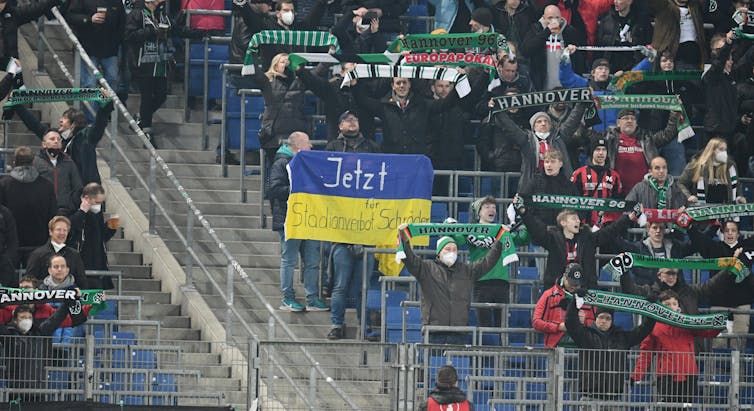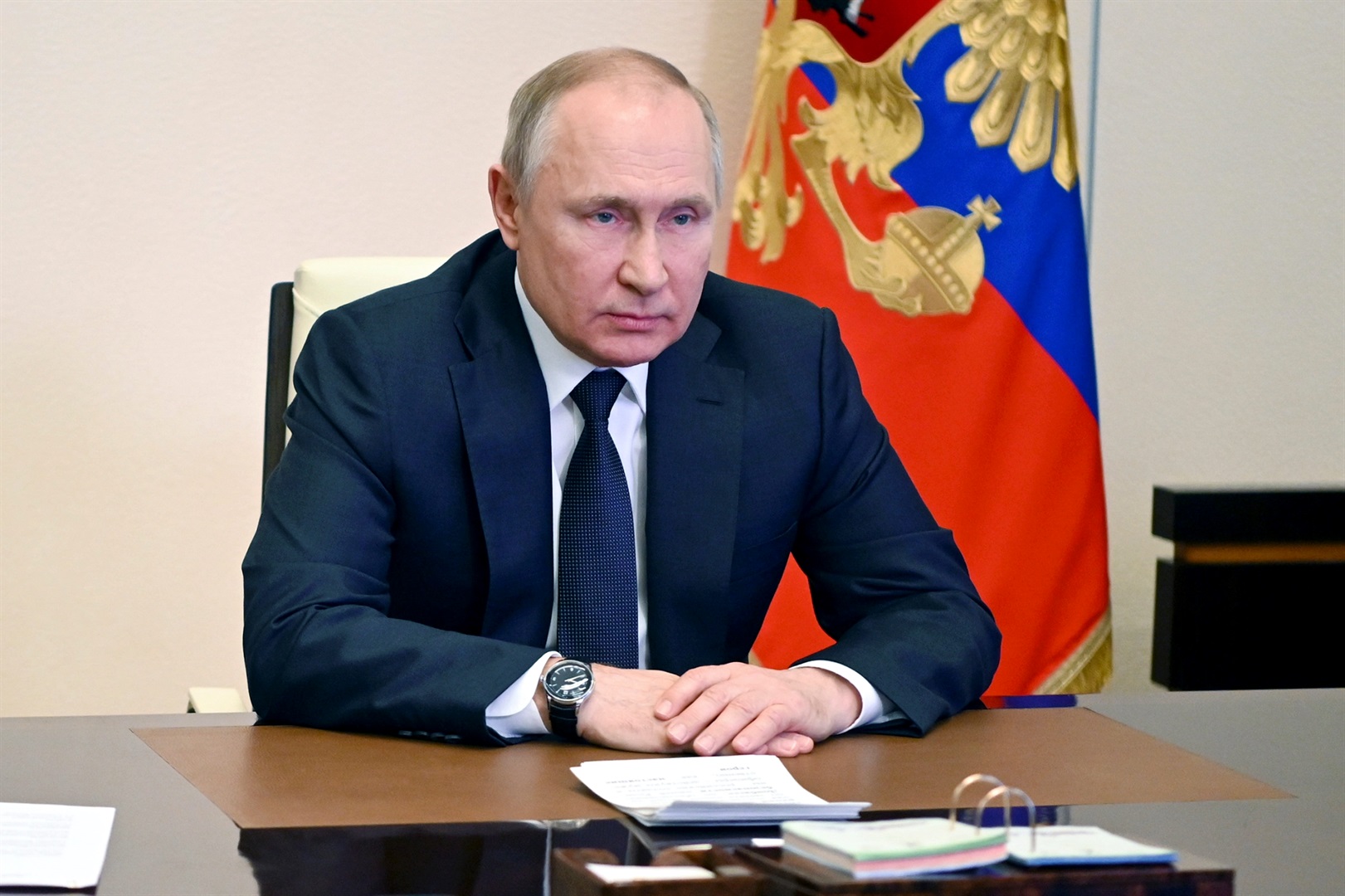Russian President Vladimir Putin chairs a Security Council meeting via video conference at the Novo-Ogaryovo residence outside Moscow, Russia, Thursday, March 3, 2022.
Andrei Gorshkov, Sputnik, Kremlin Pool photo via A
With Russia suspended from FIFA, sporting bodies may now find it harder to turn a blind eye to ethical concerns, writes Stephane Szymanski.
FIFA’s February 28, 2022 decision to suspend Russia from international competition – a decision that could see the national team barred from the 2022 FIFA World Cup – breaks a tradition of inaction by the football’s world governing body in the face of ethical failings by member states. .
Apart from the exclusion of South Africa and Rhodesia during the apartheid era, examples of national teams being prevented from competing are hard to find. Nazi Germany participated in the 1938 World Cup, as did France in the World Cups of the 1950s despite that country’s bloody wars against independence movements in Algeria and Indochina.
No sporting sanctions were imposed on the Argentine junta, which detained and executed its own people inside football stadiums that later hosted the 1978 World Cup final, and Nigeria was allowed to participate in the 1970 World Cup qualifiers as his government waged a war against Biafras that resulted in up to 2 million starvation deaths.
The list continues. But the fact is that FIFA does not usually punish national teams for the actions of the country’s government. Even in cases where authoritarian countries have been banned by FIFA, it is not because of the actions of the state. Myanmar was kicked out of the 2006 World Cup not because of the country’s brutal military dictatorship, but for failing to play a World Cup qualifier against Iran four years earlier. Syria was not allowed to qualify for the World Cup in 2014 for fielding an unqualified player rather than because of atrocities committed by the government of Bashir Al-Assad.
Exceptional circumstances
FIFA’s raison d’être stems from the desire that sport be non-political. It is a fig leaf behind which generations of FIFA administrators have hidden.
But as a scholar who has written extensively on sport and politics, I think it is absurd to claim that world football can be apolitical. International sport is organized around the concept of the nation state. Governments were quick to celebrate any triumph of their country’s sports teams as proof of their own greatness – or even to punish a team for poor performance.
What is different in the case of Russia?
There are several reasons why the invasion of Ukraine served to break FIFA’s policy of viewing national teams apolitically. The brutality of the Russian aggression is one, the obvious innocence of Ukraine is another.

This led to an outpouring of sympathy shared by fans and players across Europe. This is aided by the fact that Ukraine’s elite soccer players are scattered across some of the most prominent teams in Europe.
It must also be recognized that this sympathy in Europe seems to be linked to what can best be called cultural proximity. Palestinians, Yemenis, Afghans, Iraqis and Syrians must ask themselves what they must do to make their suffering as immediate as that of the Ukrainians. Indeed, FIFA’s persistent calls to suspend Israel for its treatment of the Palestinians have fallen on deaf ears. Likewise, football protests against China’s treatment of its Uyghur population are unlikely to result in censorship of the Chinese national team.
Nonetheless, sporting bodies, including FIFA, have become a little more welcoming of player protests lately. The willingness of at least some sporting authorities to tolerate public protests by players against racial discrimination – kneeling before the start of a game has become a common sight in Europe’s top football leagues – has paved the way for greater recognition of the political dimension of sport.
The “Olympic Truce”
Very few outside of Russia will do more than applaud FIFA’s decision. However, I think it is time for FIFA and other sports leagues to develop long-term policies, rather than an ad hoc reaction to public pressure.
Sports bodies can start by looking at the legal basis for the current decision, which is expected to be challenged by the Russian Football Union.
FIFA’s decision was inspired by the International Olympic Committee, which called on other sporting bodies to act after Russia was deemed to have violated the “Olympic truce”.
This marks a recent revival of an ancient Greek concept in which city-states were required to end all hostilities to allow athletes safe passage to compete during the games. City-states that did not honor the truce faced sanctions.
Since the 1990s, there have been several attempts to revive this tradition, and the UK succeeded in persuading all members of the United Nations to sign an Olympic truce for the 2012 Games in London. A similar truce was approved by the UN for the recent Olympic and Paralympic Winter Games in Beijing and was due to expire on March 20, 2022. It was for breaking this truce that Russia was sanctioned by world sports bodies.
Of course, FIFA would have been under the same pressure to act even if Putin had waited for the truce to expire before invading Ukraine. And it should be noted that several major sporting nations – including Australia, the United States and India – have refused to sign the truce due to China’s alleged human rights abuses.
A new set of ethical principles?
If sports are to be organized around ethical principles rather than knee-jerk reactions to current events, I believe that some sort of consensus on ethical standards and participation is needed.
Such a consensus could include banning nations that invade sovereign nations, commit human rights abuses at home, or fail to ensure equality before the law – the latter providing the ethical basis for banning South African teams due to apartheid.
Strict enforcement under these terms would have required frequent exclusions in the past. In addition to excluding Russia and China, one could have justified sanctioning the United States and the United Kingdom for their actions in Iraq; likewise Saudi Arabia for its intervention in Yemen, Turkey for its treatment of the Kurds and Brazil for its treatment of the indigenous populations, to name but a few.
The reality is that FIFA administrators have always viewed sport as ‘realpolitikal’, which meant that no national team could be excluded for fear of devaluing sporting competition itself.
As a result, bodies like FIFA and the IOC have largely embraced the good, the bad, and the ugly.
With Russia suspended, sporting bodies may now have a harder time turning a blind eye to ethical concerns. The idea that international sport is apolitical has, I believe, finally been stripped of what little credibility it ever had. And if the idea that sport is necessarily political is now more widely accepted, administrators will be forced to define exactly what they mean by “ethics”.
[The Conversation’s Politics + Society editors pick need-to-know stories. Sign up for Politics Weekly.]![]()
Stefan Szymanski, professor of sports management, University of Michigan
This article is republished from The Conversation under a Creative Commons license. Read the original article.

